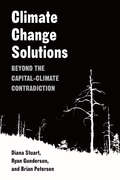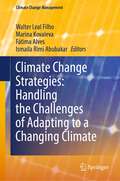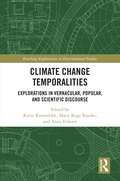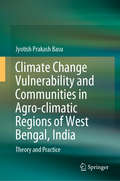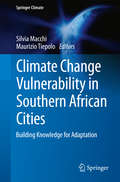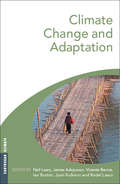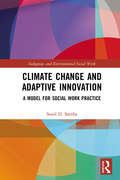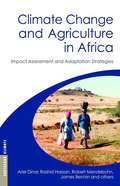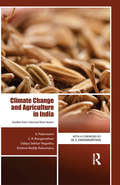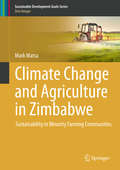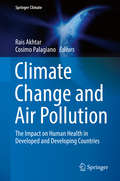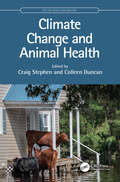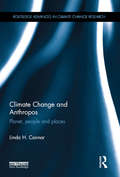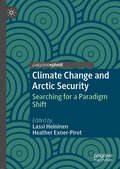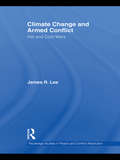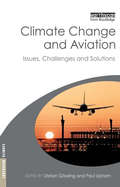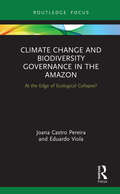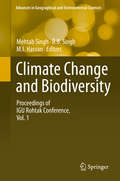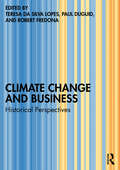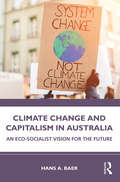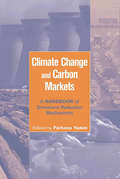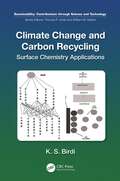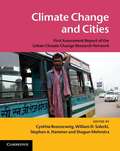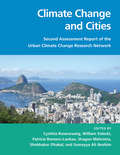- Table View
- List View
Climate Change Solutions: Beyond the Capital-Climate Contradiction
by Diana Stuart Ryan Gunderson Brian PetersenClimate Change Solutions represents an application of critical theory to examine proposed solutions to climate change. Drawing from Marx’s negative conception of ideology, the authors illustrate how ideology continues to conceal the capital-climate contradiction or the fundamental incompatibility between growth-dependent capitalism and effectively and justly mitigating climate change. Dominant solutions to climate change that offer minor changes to the current system fail to address this contradiction. However, alternatives like degrowth involve a shift in priorities and power relations and can offer new systemic arrangements that confront and move beyond the capital-climate contradiction. While there are clear barriers to a systemic transition that prioritizes social and ecological well-being, such a transition is possible and desirable.
Climate Change Strategies: Handling the Challenges of Adapting to a Changing Climate (Climate Change Management)
by Walter Leal Filho Marina Kovaleva Fátima Alves Ismaila Rimi AbubakarThis book includes information, experiences, practical initiatives and projects around the subject matter and makes it available to a wide audience. It addresses the scientific, social, political and cultural aspects of climate change impacts and respective solutions in an integrated and coherent way.Climate change as a global phenomenon imposes new challenges for survival. Extreme weather events including heat waves, storms, droughts as well as rising sea levels, warming oceans and melting glaciers threaten people's livelihoods and communities, ecosystems and habitats. Furthermore, it affects the entire food chain and increases competition for natural resources fuelling socioeconomic tensions. The results of the latest IPCC report highlight the urgent need for combating climate change. The adaptation measures to be undertaken range across sectors, thematic fields and geographical locations.Based on this need, the book focuses on the high-quality, interdisciplinary contributions on the scientific, social, economic, political and cultural aspects of climate change challenges and solutions
Climate Change Temporalities: Explorations in Vernacular, Popular, and Scientific Discourse (Routledge Explorations in Environmental Studies)
by Kyrre Kverndokk, Marit Ruge Bjærke, and Anne EriksenClimate Change Temporalities explores how various timescales, timespans, intervals, rhythms, cycles, and changes in acceleration are at play in climate change discourses. It argues that nuanced, detailed, and specific understandings and concepts are required to handle the challenges of a climatically changed world, politically and socially as well as scientifically. Rather than reflecting abstractly on theories of temporality, this edited collection explores a variety of timescales and temporalities from narratives, experience, popular culture, and everyday life in addition to science and history - and the entanglements between them. The chapters are clustered into three main sections, exploring a range of genres, such as questionnaires, interviews, magazines, news media, television series, aquariums, and popular science books to critically examine how and where climate change understandings are formed. The book also includes chapters historising notions of climate and temporality by exploring scientific debates and practices. Climate Change Temporalities will be of great interest to students and scholars of humanistic climate change research, environmental humanities, studies of temporality and historicity, cultural studies, cultural history, and popular culture.
Climate Change Vulnerability and Communities in Agro-climatic Regions of West Bengal, India: Theory and Practice
by Jyotish Prakash BasuThis book addresses the quantitative measurement of climate change vulnerability at the macro and micro-level and identifies household adaptation strategies to cope with the adverse effects of climate change. Focusing on five different agro-climatic regions of West Bengal: the hill region, foothill region, drought region, and coastal regions of Sunderban and Purba Midnapore, it presents research related to various sectors, including the agricultural, forestry and informal sectors. The book also offers insights into the impact of climate change on smallholdings, forest-dependent communities, fishing and crab collecting communities, casual labourers and workers in the informal sectors, and identifies the key vulnerabilities associated with climate change, as well as the causes of such vulnerability the extent to which remedial measures have been taken. The book particularly highlights the role of Indian governmental policies like Sarva Shiksa Abhiyan, Mahatma Gandhi National Rural Employment Guarantee Act (MGNREGA), the housing scheme, Indira Awas Yojana, the Food for Work Programme, and the rural road building scheme, Pradhan Mantri Grameen Sadak Yojana, which are important for rural development and in reducing vulnerability. Showcasing vulnerability measurement in the socio-ecological system, the book will appeal to developmental practitioners, government implementation agencies, policymakers and researchers in the field of environmental science and policymakers will find this book appealing.
Climate Change Vulnerability in Southern African Cities: Building Knowledge for Adaptation (Springer Climate)
by Silvia Macchi Maurizio TiepoloIn recent decades, extreme rains and drought have struck urban regions in Africa like never before. Nevertheless, limited information is available on which to base development of early warning systems, identification of high-risk zones and formulation of local action plans. This book is about how to build the knowledge necessary for planning adaptation to climate change in Sub-Saharan cities. It brings together lessons learned from international development actions conducted by a number of scholars in disciplines ranging from meteorology and hydrogeology to urban planning and environmental management. Selected methods to assess the impacts of extreme weather and ecological stress are presented along with possible approaches to improve the adaptive capacity of Sub-Saharan cities through institutional measures at the local government level. The book is addressed to graduate students, researchers and practitioners interested in enhancing their knowledge and skills in order to integrate climate change into applied research and development projects in urban Africa.
Climate Change and Adaptation (Earthscan Climate Ser.)
by Vicente Barros Ian Burton Jyoti Kulkarni Neil Leary James Adejuwon Rodel Lasco�This book provides valuable lessons that will improve public policy and the quality of decisions that will affect generations to come.� Richard Moss, Senior Director Climate and Energy, United Nations Foundation �An excellent addition to the body of knowledge on adaptation to climate change from the developing world, which has been largely missing until now.� Saleemul Huq, Director, Climate Change Programme, International Institute for Environment and Development �This important volume is a valuable effort on adaptation to climate change that needs to be on the desks of those seeking coping strategies for longer term responses to evolving climate changes.� Roger Kasperson, Emeritus, Clark University, USA The IPCC, winner of the Nobel Peace Prize for 2007, makes clear that while climate change mitigation is vital, the world must also begin to adapt. But how best can this be achieved? This authoritative volume (along with its companion on vulnerability), resulting from the work of the Assessments of Impacts and Adaptations to Climate Change (AIACC) project launched with the IPCC in 2002, is the first to provide an in-depth investigation of the stakes in developing countries. It covers current practices for managing climate risks, deficits between current practices and needs, the changing nature of the risks due to human caused climate change, strategies for adapting to changing risks, and the need to integrate these strategies into development planning and resource management. The book also identifies obstacles to effective adaptation and explores measures needed to create conditions that are favourable to climate change adaptation. Published with TWAS and START
Climate Change and Adaptive Innovation: A Model for Social Work Practice (Indigenous and Environmental Social Work)
by Sunil D. SanthaThe world is witnessing climate change. As responsible citizens of planet earth, we can actively participate in the co-creation of actionable knowledge and solutions. There may not be a single and linear pathway to adaptation anymore. This book explores multiple and iterative pathways of adapting to climate change and its impacts. Climate Change and Adaptive Innovation introduces an adaptive innovation model that has its premise on core values of justice, care and solidarity. Navigating collectively through shared conversations and dialogic processes, this model showcases how we could embark on an enduring journey where diverse actors could collaboratively make informed choices and take necessary actions to enhance the safety and security of their lived environment. Rooted in action research, it is envisaged that this model could enable us to facilitate the designing and implementation of people-centred ethical adaptation projects. This book will be of interest to social workers, social scientists and development practitioners who are engaged in the field of climate justice, adaptation, social innovation and sustainable livelihoods. Social work educators and students will certainly draw inspiration from the stories that are shared in this book. It will further motivate many transdisciplinary professionals to engage with action research as a method of innovation, reflection and practice
Climate Change and Agriculture in Africa: Impact Assessment and Adaptation Strategies (Earthscan Climate)
by Ariel Dinar Robert Mendelsohn Rashid Hassan James Benhin et al'This is a well researched, thorough and impressive work on climate change and agriculture in Africa. I recommend it to students, researchers and practitioners working on climate change issues' Jabavu Clifford Nkomo, senior programme specialist, IDRC This landmark book encompasses a comprehensive assessment of the potential economic impacts of future climate change, and the value of adaptation measures in Africa for different zones, regions, countries and farm types. Researchers developed and applied multiple analytical procedures to assess quantitatively how climate affects current agricultural systems in Africa, enabling them to predict how these systems may be affected in the future by climate change under various global warming scenarios, and suggesting what role adaptation could play. The study is the first to combine spatially referenced household survey data with climatic data at both national and international levels. This book provides vital knowledge about the impacts of climate change on Africa, serving as a guide to policy intervention strategies and investment in adaptation measures. It makes a major contribution to the analysis of climate change impacts and developing adaptation strategies, especially in the highly vulnerable farming communities in the developing world. Published with CEEPA and supported by the World Bank.
Climate Change and Agriculture in India: Studies from Selected River Basins
by Udaya Sekhar Nagothu K. Palanisami Krishna Reddy Kakumanu C. R. RanganathanThis book provides an overview of climate change in India using river basin data and analytical and econometric methods. It, first, makes a quantitative assessment of how climate change affects agricultural and food production systems; second, predicts how these systems may respond to climate change; and third, suggests adaptation measures and strategies to improve the income of farmers, increase production, save water and conserve environment.The work will be greatly useful to policy-makers, researchers and teachers of agricultural economics, environmental studies and economics and development studies as also to research organizations dealing with climate modelling and resource management.
Climate Change and Agriculture in Zimbabwe: Sustainability in Minority Farming Communities (Sustainable Development Goals Series)
by Mark MatsaThis book proves, through empirical research, that indigenous and traditional agricultural communities have experienced severe climate change impacts, and have developed corresponding livelihood strategies to strengthen their resilience in a variable climate. With a focus on indigenous minority farming communities in the developing region of South-Western Zimbabwe, the study presents both qualitative and quantitative approaches of data analysis to assess sustainability problems amid climate change and climate variability challenges, and proposes potential solutions. In eight chapters, the book expands on the scarce availability of community-based research on climate change and variability in Zimbabwe.The book is meant for college and university students and stakeholders involved in development work in rural minority farmer communities, especially in climate change prone regions of Africa and other developing countries who have very few options of adaptation and mitigation.
Climate Change and Air Pollution: The Impact on Human Health in Developed and Developing Countries (Springer Climate)
by Rais Akhtar Cosimo PalagianoThis book discusses regional and international climate-change, air- pollution and human-health scenarios. The research, from both industrialized and developing countries, focuses on region-specific perspectives of climate change impacts on air pollution. After analyzing the variations of climate data over recent decades, the authors consider the different effects of climate change on air pollution and health. As stressed by the IPCC, "pollen, smoke and ozone levels are likely to increase in a warming world, affecting the health of residents of major cities. Rising temperatures will worsen air quality through a combination of more ozone in cities, bigger wild fires and worse pollen outbreaks," according to a major UN climate report. The report follows the World Health Organization in finding that air pollution is the world's greatest environmental health risk, killing 7 million people in 2014 (compared to 0. 4 million deaths due to malaria). Deteriorating air quality will most affect the elderly, children, people with chronic ill-health and expectant mothers. Another report suggests that more than 5. 5 million people die prematurely each year due to air pollution with over half of those deaths occurring in China and India. A study on the air pollution in the USA,suggests that more than half of US population lives in areas with potentially dangerous air pollution, and about six out of 10 of the top cities for air pollution in the USA are located in the state of California. In the face of future climate change, scientists have urged stronger emission controls to avoid worsening air pollution and the associated exacerbation of health problems, especially in more populated regions of the world. It is hoped that the implementation of the Paris Climate Agreement will help minimize air pollution. Additionally the authors consider the various measures that different countries and groups of countries, like the European Union, have adopted to mitigate the problems arising from climate change and to safeguard the health of population. The book examines the increasing incidence of diseases largely caused by climate change. The countries/regions covered in this study include the USA, Northern Europe (U. K). ,Southern Europe ( Italy), Canada, Australia, East Asia, Russia, Hong Kong, Taiwan, Thailand, Malaysia, Indonesia, India, South Africa, Mexico, Brazil, Caribbean countries, and Argentina.
Climate Change and Animal Health (CRC One Health One Welfare)
by Colleen Duncan Craig StephenThis benchmark publication assembles information on the current and anticipated effects of climate change on animal health. It empowers educators, managers, practitioners, and researchers by providing evidence, experience, and opinions on what we need to do to prepare for, and cope with, the largest threat ever to have faced animals on this planet. With expert contributors from across the globe, the text equips the reader with information and means to develop sustainable adaptation or mitigation actions. After introducing animal health in a climate change context, chapters look at specific animal health impacts arising from climate change. The book concludes with suggestions on teachable and actionable ideas that could be used to mobilize concepts provided into education or advocacy. This book was written amid the COVID-19 pandemic and in the face of ever-increasing reports of on-the-ground, real-life climate impacts. Large scale wildfire and ocean heat waves killed unprecedented numbers of animals while droughts in some areas and floods in others displaced thousands of livestock and made food scarce for even more. Climate change is real, and it is here. How we respond will have profound implications for people, biodiversity, welfare, conservation, societies, economies and ecosystems. Today's veterinary educators are awakening to the need to adapt and train a new generation of animal health professions who can understand and plan for climate change, and this book is an essential resource.
Climate Change and Anthropos: Planet, people and places (Routledge Advances in Climate Change Research)
by Linda H. ConnorAnthropos, in the sense of species as well as cultures and ethics, locates humans as part of much larger orders of existence – fundamental when thinking about climate change. This book offers a new way of exploring the significance of locality and lives in the epoch of the Anthropocene, a time when humans confront the limits of our control over nature. Many scholars now write about the ethics, policies and politics of climate change, focussing on global processes and effects. The book’s innovative approach to cross-cultural comparison and a regionally based study explores people’s experiences of environmental change and the meaning of climate change for diverse human worlds in a changing biosphere. The main study site is the Hunter Valley in southeast Australia: an ecological region defined by the Hunter River catchment; a dwelling place for many generations of people; and a key location for transnational corporations focussed on the mining, burning and export of black coal. Abundant fossil fuel reserves tie Hunter people and places to the Asia Pacific – the engine room of global economic growth in the twenty-first century and the largest user of the planet’s natural resources. The book analyses the nexus of place and perceptions, political economy and social organisation in situations where environmental changes are radically transforming collective worlds. Based on an anthropological approach informed by other ways of thinking about environment-people relationships, this book analyses the social and cultural dimensions of climate change holistically. Each chapter links the large scales of species and planet with small places, commodity chains, local actions, myths and values, as well as the mingled strands of dystopian imaginings and strivings for recuperative renewal in an era of transition.
Climate Change and Arctic Security: Searching for a Paradigm Shift
by Lassi Heininen Heather Exner-PirotThis book assesses the construction of security in the context of climate change, with a focus on the Arctic region. It examines and discusses changes in the security premises of the Arctic states, from traditional security to environmental and human security. In particular, the book explores how climate change impacts security discourses and premises as well as theoretically discussing the possibility for another change, from circumpolar stability into peaceful change. Chapters cover topics such as the ethics of climate change in the arctic, China’s emerging power and influence on arctic climate security, the discursive transformation of the definition of security and the intersection between urban, climate and Arctic studies. The book concludes with the question of whether a paradigm shift in our understanding of traditional security is possible, and whether it is already occurring in the Arctic.
Climate Change and Armed Conflict: Hot and Cold Wars (Routledge Studies in Peace and Conflict Resolution)
by James R. LeeThis book examines the evolution of the relationship between climate change and conflict, and attempts to visualize future trends. Owing to the accumulation of greenhouse gases in the atmosphere, current trends in climate change will not appreciably alter over the next half century even if drastic action is taken now. Changes in climate will produce unique types and modes of conflict, redefine the value of important resources, and create new challenges to maintaining social order and stability. This book examines the consequences of climate change and argues that it has and will produce two types of different types of conflict: 'cold wars' and 'hot wars'. Cold wars will occur in northern and southern latitudes as warming draws countries into possible conflict due to expanding interests in exploiting new resources and territories (inter-state conflict). Hot wars will break out around the equator as warming expands and intensifies dry areas, increasing competition for scarce resources (intra-state conflict). Conflict is not inevitable, but it will also be a consequence of how states, international institutions and people react to changes in climate. Climate change and conflict have always shaped human experiences. This book lays out the parameters of the relationship, shows its history, and forecasts its trends, offering future conditions and opportunities for changing the historical path we are on. This book will be of great interest for students of climate change and environmental security, peace and conflict studies, and IR/security studies in general. James R. Lee is a Professor in the School of International Service, American University, Washington, DC and Associate Director of American University's Center for Teaching Excellence. He is author of several books on international relations, including, most recently, Exploring the Gaps: Vital Links Between Trade, Environment and Culture (2000).
Climate Change and Aviation: Issues, Challenges and Solutions (Earthscan Climate Ser.)
by Paul Upham Stefan Gösling'This is a timely, challenging and fascinating book on a topic of central importance to the success or otherwise of our climate change policies. It sets down a clear marker for what has to be done in the aviation sector.' Professor John Whitelegg, Stockholm Environment Institute, University of York, UK 'Climate Change and Aviation presents a clear picture of the transport sector's greatest challenge: how to reconcile aviation's immense popularity with its considerable environmental damage and its dependence on liquid hydrocarbon energy sources. This book avoids wishful thinking and takes the much harder, but more productive, path of considering difficult solutions that clash with short-term and short-sighted expectations about the unlimited growth potential for flying.' Professor Anthony Perl, Urban Studies Program, Simon Fraser University, Canada 'A convincing and timely collection that brings together an impressive range of expertise. The book integrates various perspectives into a powerful core argument - we must do something, and quickly, to tackle the impact of aviation on our environment. The authors recognise the political difficulties associated with promoting change but present constructive options for policy makers. Required reading, especially for transport ministers set on promoting the growth of air travel.' Professor Jon Shaw, Director of the Centre for Sustainable Transport, University of Plymouth, UK Trends such as the massive growth in availability of air travel and air freight are among those which have led to aviation becoming one of the fastest growing emitters of greenhouse gases. These trends have also caused a shift in expectations of how we do business, where we go on holiday, and what food and goods we can buy. For these reasons aviation is (and is set to stay) high up on global political, organizational and media agendas. This textbook is the first to attempt a comprehensive review of the topic, bringing together an international team of leading scientists. Starting with the science of the environmental issues, it moves on to cover drivers and trends of growth, socio-economics and politics, as well as mitigation options, the result being a broad yet detailed examination of the field. This is essential reading for undergraduate and postgraduate courses in transport, tourism, the environment, geography and beyond, while also being a valuable resource for professionals and policymakers seeking a clear understanding of this complex yet urgently pressing issue.
Climate Change and Biodiversity Governance in the Amazon: At the Edge of Ecological Collapse? (Routledge Advances in International Relations and Global Politics)
by Joana Castro Pereira Eduardo ViolaThis book provides an analysis of the recent governance of the Amazon in Brazil, Peru, Bolivia and Colombia with a particular focus on deforestation processes, demonstrating that current policies and political and socioeconomic dynamics in the four countries are risking the forest’s resilience. The authors examine and compare Amazonian politics and policies under different administrations, concentrating on the main actors, policies and dynamics that have affected the region, as well as on the institutional and political environment in which deforestation processes were embedded in different periods. Essentially, the book makes an analytical contribution towards a better understanding of the political, economic and social challenges confronting conservation policy in the Amazonian countries. Climate Change and Biodiversity Governance in the Amazon: At the Edge of Ecological Collapse? is essential reading for students and researchers in the fields of environmental studies and sustainability, Latin American studies, political science and international relations, as well as for policymakers and practitioners working in conservation and development.
Climate Change and Biodiversity: Proceedings of IGU Rohtak Conference, Vol. 1 (Advances in Geographical and Environmental Sciences)
by R. B. Singh Mehtab Singh M. I. HassanThe over-exploitation of important earth resources such as land and water has led to a number of environment-related problems the world over. At the same time, land-use change caused by various human activities has led to extinction of many plant and animal habitats and species. In this context, the relevance of biodiversity for human survival is becoming a major international political issue as scientific evidence builds on the global health implications of biodiversity loss. These issues are closely linked with the issue of climate change, as many of the health risks due to climate change are associated with rapid degradation of biodiversity. This present work focuses on holistic natural resource-based spatio-temporal planning, development, and management and considers them as essential to save the degraded ecosystem for sustainable resource management. Contributions are compiled in two volumes: 1. Climate Change and Biodiversity and 2. Landscape Ecology and Water Management. Geoinformatics along with its tools such as remote sensing and geographical information systems (GIS) have been used in assessing the results of various environmental problems both physical and social. The volume will be useful for geographers, geoscientists, hydrologists, landscape ecologists, environmentalists, engineers, planners and policy makers.
Climate Change and Business: Historical Perspectives
by Paul Duguid Robert Fredona Teresa da Silva LopesClimate change is the greatest market failure in world history and thus the most urgent challenge in the world of business for the foreseeable future. This book brings together experts to shed light on the historical impact of business on climate change and of climate change on business.The book shows how corporate responses to climate change emerged out of earlier environmental concerns, regulatory frameworks, and in many cases already established business strategies. Contributors to the book analyse the evolution of business strategies to navigate environmental challenges even before climate crisis was widely recognised as an urgent concern.The historical insights presented by this book will be essential reading for business historians, as well as students, scholars, and reflective practitioners with an interest in the environment, political economy, business strategy, and risk management.
Climate Change and Capitalism in Australia: An Eco-Socialist Vision for the Future
by Hans A. BaerRecognizing that climate politics has been an increasingly contentious and heated topic in Australia over the past two decades, this book examines Australian capitalism as a driver of climate change and the nexus between the corporations and Coalition and Australian Labor parties. As a highly developed country, Australia is punching above its weight in terms of contributing to greenhouse gas emissions despite rising temperatures, droughts, water shortages and raging bushfires, storm surges and flooding, and the bleaching of the Great Barrier Reef. Drawing upon both archival and ethnographic research, Hans Baer examines Australian climate politics at the margins, namely the Greens, the labour union, the environmental NGOs, and the grass-roots climate movement. Adopting a climate justice perspective which calls for "system change, not climate change" as opposed to the conventional approach of seeking to mitigate emissions through market mechanisms and techno-fixes, particularly renewable energy sources, this book posits system-challenging transitional steps to shift Australia toward an eco-socialist vision in keeping with a burgeoning global socio-ecological revolution. Accessibly written and including an interview with renowned comedian and climate activist Rod Quantock OAM, this book is essential reading for academics, students and general readers with an interest in climate change and climate activism.
Climate Change and Carbon Markets: A Handbook of Emissions Reduction Mechanisms
by Farhana YaminClimate change is an environmental problem of unprecedented complexity, not just in terms of its physical, social, economic and political impacts, but particularly in terms of the range of policy instruments being designed by countries to reduce greenhouse gas emissions. Climate Change and Carbon Markets aims to provide an accessible and practical guide to cutting edge market-based mechanisms which will reduce greenhouse gas emissions. This book is a guide for national and international policy-makers and industry professionals, who need to understand the carbon markets established pursuant to the Kyoto Protocol, one of the most complex agreements ever negotiated. The book sets out how carbon markets will function by explaining the rules, institutions and procedures of the Kyoto mechanisms, including: emissions trading, joint implementation (JI) and the Clean Development Mechanism (CDM). It also provides an in-depth explanation of the EU Emissions Allowance Trading Scheme, emerging mechanisms in the US and developing countries, and how these will link up. For policy-makers, researchers and scholars; industry practitioners, companies, market service providers, technical and legal consultants, NGOs and all stakeholder organizations engaged in the Kyoto markets, this is the authoritative and comprehensive practical guide to this rapidly evolving area. Contains the full text of the key European Union documents setting up the EU Emissions Allowance Trading Scheme and the Linking Directive.
Climate Change and Carbon Recycling: Surface Chemistry Applications (ISSN)
by K. S. BirdiClimate Change and Carbon Recycling: Surface Chemistry Applications describes the application of surface chemistry methods for carbon capture and recycling in relation to climate change and atmospheric CO2 levels. The text is suitable for online education, with both basic and educational descriptions of the climate change process and carbon recycling methods like the adsorption and absorption of CO2 on solids. This book leads to a better understanding of a complex phenomenon and highlight the importance of CO2 capture and sequestration for the future to enable the utilization of fossil fuels without contributing to atmospheric greenhouse gases.Features This unique volume specifically highlights the surface chemistry aspects of carbon capture and recycling (CCR) Fills the need for an online textbook edition, which provides a basic and educational description of the climate change process and carbon capture/recycling Describes the application of surface chemistry methods for carbon capture and recycling, such as adsorption/absorption of CO2 Discusses the importance of recycling in reducing and controlling the concentration of carbon dioxide in the air (420 ppm: 0.042%) Describes the importance of the technology related to carbon capture/recycling and sequestration (CCS) from fossil fuel energy plants as a means of CO2 control
Climate Change and Cities: First Assessment Report of the Urban Climate Change Research Network
by Cynthia Rosenzweig William D. Solecki Stephen A. Hammer Shagun MehrotraUrban areas are home to over half the world's people and are at the forefront of the climate change issue. The need for a global research effort to establish the current understanding of climate change adaptation and mitigation at the city level is urgent. To meet this goal a coalition of international researchers - the Urban Climate Change Research Network (UCCRN) - was formed at the time of the C40 Large Cities Climate Summit in New York in 2007. This book is the First UCCRN Assessment Report on Climate Change and Cities. The authors are all international experts from a diverse range of cities with varying socio-economic conditions, from both the developing and developed world. It is invaluable for mayors, city officials and policymakers; urban sustainability officers and urban planners; and researchers, professors and advanced students.
Climate Change and Cities: Second Assessment Report Of The Urban Climate Change Research Network
by Cynthia Rosenzweig Shagun Mehrotra Shobhakar Dhakal William Solecki Somayya Ali Ibrahim Patricia Romero-LankaoThe Urban Climate Change Research Network's Second Assessment Report on Climate Change in Cities (ARC3.2) is the second in a series of global, science-based reports to examine climate risk, adaptation, and mitigation efforts in cities. <P><P>The book explicitly seeks to explore the implications of changing climatic conditions on critical urban physical and social infrastructure sectors and intersectoral concerns. The primary purpose of ARC3.2 is to inform the development and implementation of effective urban climate change policies, leveraging ongoing and planned investments for populations in cities of developing, emerging, and developed countries. <P>This volume, like its predecessor, will be invaluable for a range of audiences involved with climate change and cities: mayors, city officials and policymakers; urban planners; policymakers charged with developing climate change mitigation and adaptation programs; and a broad spectrum of researchers and advanced students in the environmental sciences. Contains double the number of chapters as the First ARC3 Report, based on feedback from numerous climate conferences around the world and a survey of city experts and practitioners.<P> Includes many new topics, including urban ecology and biodiversity, environmental equity and justice, economics, finance, and the private sector, urban planning and design, urban solid waste, urban coastal zones, mitigation and adaptation, and housing and informal settlements.<P> All sectors from the First ARC3 Report have been thoroughly updated.
Climate Change and Climate Modeling
by J. David NeelinProvides students with a solid foundation in climate science, with which to understand global warming, natural climate variations, and climate models. As climate models are one of our primary tools for predicting and adapting to climate change, it is vital we appreciate their strengths and limitations. Also key is understanding what aspects of climate science are well understood and where quantitative uncertainties arise. This textbook will inform the future users of climate models and the decision-makers of tomorrow by providing the depth they need, while requiring no background in atmospheric science and only basic calculus and physics. Developed from a course that the author teaches at UCLA, material has been extensively class-tested and with online resources of colour figures, Powerpoint slides, and problem sets, this is a complete package for students across all sciences wishing to gain a solid grounding in climate science.
